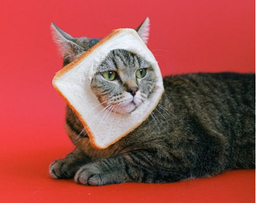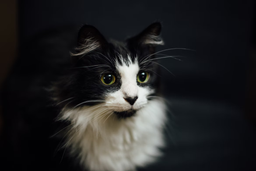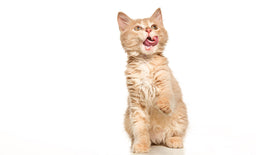Can cats eat olive oil? Untamed explains the risks and benefits
Olive oil is one of those cure-all “natural remedies” that some of us blindly worship. From cooking to cosmetics, humans use it for various purposes, but does it help felines in any way? Can cats eat olive oil and enjoy its health benefits, or can it be harmful to them?
Olive oil contains numerous antioxidants and healthy monounsaturated fats that may occasionally help kitties. Many cat parents use it to alleviate gastrointestinal and skin issues in cats. Some even recommend it as a dietary supplement.
The effectiveness of olive oil is limited in cats. Felines have different biology than humans, and overconsumption of any oil can make them sick.
Olive oil can never replace actual veterinary medicines or proper cat food. Your kitty’s overall health and wellness depend on the quality of their regular meals. In this guide, we’ll:
- Look into the pros and cons of giving cats olive oil
- Discuss what food can help resolve common feline health problems
Is olive oil safe for cats?
Olive oil isn’t poisonous to cats, but they should eat it in tiny portions as it’s 100% fat. If you’re feeding it to your kitty, don’t give them more than a splotch (about 5–20 drops) at a time. Overfeeding is unsafe and can potentially lead to:
- A calorie overload—One teaspoon of olive oil contains about 40 calories, which is about 16–22% of the daily caloric needs of indoor cats. Regular intake can create a surplus of calories in their everyday diet, leading to weight gain. Avoid giving olive oil to overweight kitties on a weight loss diet
- Stomach upsets—Cats don’t need more than 20% fat in their diet, ideally from animal sources, not plants. Kitties also don’t have sufficient digestive enzymes to process a large amount of fat at a time. Consuming more than a tablespoon of olive oil can trigger diarrhoea, stomach cramps, or vomiting of digested and undigested food
Minimally processed extra virgin olive oil is safer for feline consumption than the chemically treated refined variants. Consult a vet before giving olive oil to cats with a weak disposition, such as weaning kittens or frail seniors with digestive, metabolic, or kidney conditions.
Are some cats allergic to olive oil?
Although it’s rare, the immune system of some cats can reject the unique compounds in olives or olive oil, triggering an allergic reaction. Stop giving the product to your kitty if you notice the following symptoms:
- Red and itchy eyes
- Patchy skin and hair loss
- Vomiting and diarrhoea
- Retching
- Inappetence
- Difficulty breathing
- Bloating
Cats and olive oil—what are the health benefits?
Olive oil is often deemed one of the best oils for cats due to its low content of saturated fats, which are bad, cholesterol-inducing components. Unlike coconut oil, which contains 80–90% saturated fats, olive oil contains only 14%.
As far as feline health benefits are concerned, olive oil is primarily used to:
- Relieve digestive and bowel issues
- Reduce hairballs
- Resolve skin problems
Many cat parents also use the oil to manage conditions like feline diabetes and heart disease, but the efficiency of the product has never been proven.
Let’s examine the common usages of olive oil for kitties.

Is olive oil poisonous to cats? No, but fat will be fat, and cats don’t need too much of that.
Source: stevepb
Is olive oil good for cats with digestive or bowel issues?
Olive oil has some laxative properties, making it suitable for cats suffering from mild to moderate constipation or IBS (irritable bowel syndrome). Constipated kitties have hard and dry stool, so olive oil can soften it and help cats pass it through. The oil’s anti-inflammatory compounds can also reduce pain during IBS flare-ups.
You can give about half a teaspoon of olive oil to your kitty two times a day till they recover from these particular gastrointestinal issues. Other home remedies that can help are:
- Boiled and mashed pumpkin and carrots
- Other constipation-friendly oils, such as krill oil, avocado oil, and sunflower oil
If the condition persists beyond three days, it’s better to consult a vet and get prescription medicines.
Remember that olive oil can only be a temporary fix, not a remedy. If your cat suffers from frequent bouts of constipation or IBS, it’s often because of a poor diet, extreme stress and anxiety, or specific neurological problems.
Giving olive oil to cats suffering from frequent hairballs—does it work?
All cats throw up hairballs occasionally. It’s a side-effect of their meticulous grooming routine and more common in fluffy breeds like Ragdolls, Persians, and Maine Coons. Coughing up hairballs frequently is not normal, and it usually means your kitty:
- Has poor coat health due to inadequate or insufficient protein in their diet
- Cannot eliminate ingested fur with regular bowel movements
Olive oil can help expel hairballs by binding the accumulated fur with poo. The recommended dose is a teaspoon of olive oil every week or so, but its efficacy is questionable. If you want a reliable long-term solution for hairballs, switch your kitty to a high-protein diet of whole meat and fish.
Olive oil for cats with dandruff and skin problems
Olive oil contains collagen-stimulating carotenoids and vitamin E, making it a suitable topical remedy for various mild feline skin conditions, like dandruff and dry skin. Here’s how to use it:
- Take one to two cups of lukewarm extra virgin olive oil, depending on the size of the affected area
- Apply the oil to the target areas and massage gently
- Let the oil seep in for 15–30 minutes
- Wash it off with a gentle soap or shampoo
This treatment should be repeated once every three days till the skin heals. If your kitty has a chronic skin condition, consult a vet before using olive oil.
Skin diseases in felines often come from a diet lacking in:
- Taurine—Taurine is a crucial amino acid available for cats in poultry, dark meat, and seafood. It helps maintain eye and heart health and regulates reproductive function in felines. The micronutrient also works as an antioxidant supporting skin regeneration. Without enough taurine, kitties tend to develop rough and patchy skin
- Omega-3 fatty acids—Cats need omega-3 fatty acids to bolster their skin’s natural barrier function. A deficiency makes their skin prone to dandruff and dermatitis
The table below offers an overview of the approximate omega-3 fatty acid content in different kinds of meat:
|
Meat |
Serving size |
The omega-3 fatty acid content |
|
85 grams |
30 milligrams |
|
|
Tuna |
85 grams |
228 milligrams |
|
Salmon |
100 grams |
2627 milligrams |
|
Sardines |
100 grams |
1,480 milligrams |
|
Shrimp or prawns |
85 grams |
295 milligrams |
|
Mackerel |
100 grams |
5,134 milligrams |
|
Pork or ham |
100 grams |
481 milligrams |
|
Beef or bacon |
100 grams |
40 milligrams |
Since seafood is the best source of omega-3 fatty acids, make sure to include it in your kitty’s diet.

Seafood is the secret to feline beauty—furry stunners should have at least two seafood meals each week.
Image (c) Untamed
Is olive oil good for a diabetic cat?
There’s a lot of hearsay around olive oil being a life saviour of diabetic cats, but most of it is hogwash. While olive oil may work for constipation or dandruff, you cannot use it to cure severe feline illnesses like diabetes. Diabetic cats need prescription medicines and a low-carb (sugar-free and grain-free) diet to keep their blood glucose levels under control. Untreated diabetes can cause anorexia, lethargy, and decreased appetite, eventually leading to coma and death.
Olive oil is a hack, not a solution
If you want to use olive oil as a temporary remedy, pour the recommended dose into cat food. Don’t administer the oil orally with a spoon or dropper as your kitty might inhale it and develop aspiration pneumonia, which is a life-threatening medical emergency.
Beyond tummy and skin issues, olive oil is also advertised as beneficial for age-related feline diseases like UTIs, cystitis, arthritis, hyperthyroidism, and struvite stones because it is rich in antioxidants that boost your kitty’s natural health and immunity.
While it’s not entirely untrue, olive oil cannot be a standalone treatment for any illness. Be careful while browsing the internet for random miraculous home remedies. Nothing can help kitties if the source of their problem is an unbalanced diet.
Pro dietary hacks to keep kitties healthy!
Cats are carnivores and need meat to thrive. In the wild, they eat raw meat from freshly killed birds and rodents. Domestic cats get the same profile of nutrients from raw or cooked whole meat. Top nutritionists recommend giving kitties high-protein, wet food regularly (meat should be the main ingredient) for all-around health and wellness.
Here are some handy tips on improving your cat’s diet:
- Ditch dry food—Vets don’t recommend giving kibbles to kitties as it leads to dehydration and constipation. Dry food also undergoes heavy processing, which reduces the bioavailability of the nutrients. Biscuits usually contain over 40% carbs. Cat food shouldn’t have more than 3% carbs because overconsumption causes obesity and diabetes, especially in sterilised cats
- Opt for suitable protein sources—Cats suffer from hairballs and bad skin when they don’t get enough healthy proteins. Ensure your kitty’s diet has more than 50% animal protein. Felines do better on lean meat like tuna, salmon, chicken, etc. Avoid anything too fatty, including dairy, eggs, pork, beef, and lamb
- Pay attention to cat food ingredients—Make a habit of scanning food labels for filler ingredients. They can be advertised as protein or vitamin sources but are ultimately inexpensive substitutes for real meat. Fillers include:
- Meat derivatives and meals
- Vegetable proteins
- Dairy or soy proteins
- Grains (rice, wheat, sweetcorn, etc.)
Besides getting quality wet food, you should also set up a fixed feeding schedule to regulate your kitty’s eating and pooing habits.

Forget olive oil, hooman—here’s a tasty alternative! Untamed wet food is a power-packed health booster in a can!
Image (c) Untamed
You can't go wrong with Untamed
Untamed offers high-protein wet food to keep felines fit and healthy. Our gravy and jelly meals offer 60–63% whole meat, free from animal derivatives, plant proteins, sugar, and grains. Untamed meals have:
- High protein content—Our products contain two times more protein than the average retail product. We use lean meat like chicken breast and liver, duck, tuna, salmon, mackerel, and sardine
- Human-grade meat—We use prime cuts of meat from the human supply chain as it is more nutritious than feed-grade meat and animal byproducts
- Vet-formulated recipes—We got nutritionists on board to design our meals to offer balanced nutrition. Our food is infused with taurine and vitamin E to maintain your kitty’s immune system and skin health
- High bioavailability—We steam our meals to prevent nutrient depletion and keep the natural texture, flavour, and aroma intact
- Allergen-free formulas—Untamed is free from all common allergens. We ditch harsh chemical preservatives, food colouring, and artificial flavour enhancers so that our food is safe for every kitty. Our single-protein Chocka Chicken and Tuck-in Tuna meals are tailored to the needs of cats with food allergies and stomach sensitivities
- Spectacular taste—Cats reject wet food containing fillers or stale meat. Our dishes are delicious and fresh, and they are irresistible even to fussy eaters
Take our TRY NOW quiz and order your first taster pack at the best rate!
Worried about hairballs or poo problems? Let Untamed take control
A whole meat diet can improve the health of sick and frail cats. Fresh meat and fish contain plenty of fat, moisture, vitamins, and minerals cats need to thrive. Untamed products are made to facilitate easy digestion and nutrient absorption, so you won’t have to worry about using olive oil or other supplements to keep your kitty fit and happy!
Our satisfied clients have shared their feedback with us, and here’s how they describe the Untamed effect:
|
Timeline |
Benefits |
|
Week 1 |
|
|
Week 8 |
|
|
Week 16 and up |
|

Coat that’s velvety smooth—the Untamed effect on your kitty will be hard to miss!
Image (c) Untamed
Can Untamed work for kittens and senior cats?
Untamed makes age- and breed-neutral products that support your kitty’s health at every life stage. Here’s how:
- Untamed for kittens—Freshly-weaned kittens need a high-protein, high-calorie diet for optimal growth and stabilised weight gain. With Untamed’s safe allergen-free meals, you won’t have to worry about kitten diarrhoea or vomiting. As far as portions are concerned, three to five cans of Untamed should be perfect for kittens under six months, depending on their weight and growth rate, but consult your vet to determine optimal amounts
- Untamed for adults—Adult cats gain weight quickly on dry, semi-moist, or mixed diets. Untamed’s sugar-free, low-carb meals will keep them fit and prevent obesity and diabetes
- Untamed for seniors—Senior cats can be fussy about food due to weak digestion and falling teeth. Untamed’s highly digestible products are ideal for sparking the appetite and maintaining weight in older kitties
Untamed is favoured by all breeds. From laidback British Shorthairs to feisty Siamese and Bengals, all felines are in love with our delicacies!

Join the cat food revolution—let Untamed be a life-long companion for your kitty!
Image (c) Untamed
Ordering Untamed is smoother than olive oil
We value your time and comfort, so you can get the Untamed taster pack delivered to your door in just a few clicks:
- Go to our online cat food store
- Take our TRY NOW quiz
- Select the products you like
- Place the order
If your cat likes the samples and they want more, we will deliver monthly Untamed supplies with no shipping cost. You can modify your Untamed cat food subscription, as well as postpone or cancel a delivery anytime—we’re all about your convenience!
We’re an ethical and Carbon Neutral Certified brand, meaning:
- Our packaging is 100% recyclable
- Our meat is cruelty-free
- We get our seafood from dolphin-safe suppliers
Can cats have olive oil every day?
Many cat parents add olive oil to their kitty’s daily meals as a supplement, even when their pet is doing fine. Some also believe that since the product has antibacterial and antifungal properties, infusing cat food with it will boost their cat’s dental health.
The claims regarding the health benefits of olive oil are far-fetched, and nutritionists don’t recommend using it regularly because consuming olive-oil-enriched food increases the risk of a calorie surplus. Cats on a balanced diet of complete wet food with whole meat don’t need additional dietary supplements.

Olive oil in cat food? Is this a new party trick, hooman? I must say, I’m underwhelmed.
Source: Erin_Hinterland
Digestion-friendly snacks for cats
If your kitty suffers from frequent tummy troubles, be careful about snacks and treats. Human food like pasta, bread, milk, and cheese can only make things worse.
Here are some healthy alternatives:
- Homemade meat soup or bone broth (without seasonings)
- B.A.R.F. snacks (following the sanitary protocols is essential)
- Non-fat yoghurt
- Air-popped popcorn (unseasoned)
- Cat grass or catnip (in tiny portions only)
- Bite-sized fruits (feline-friendly options include strawberries, bananas, apples, etc.)
- Cooked and mashed vegetables like potatoes and squash (not more than 2–3 teaspoons)
Grapes, chocolate, and garlic are toxic for all cats, so keep them away from your furry friend.
Check out our other guides to what cats can or cannot eat:
|
|

![Best food for Ragdoll cats in the UK [Broken Down]](http://untamed.com/cdn/shop/articles/featured_best_food_for_ragdoll_cats_uk.jpg?v=1646818249&width=256)

